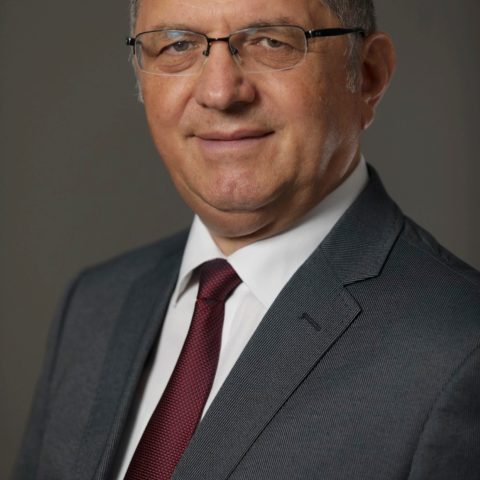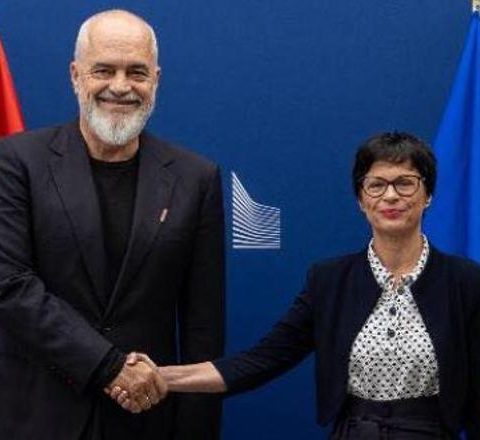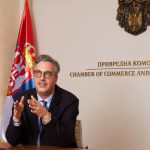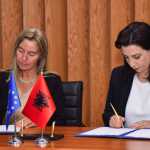By Sidonja Manushi
TIRANA, Jan. 13 – As political relations between Albania and Kosovo, tied historically by a common language, culture and national identity, are becoming more and more complex, the Kosovo Foundation for Open Society and the Open Society Foundation for Albania completed an extensive research at the end of 2018 in both countries to measure the interaction and attitude of citizens in a range of important matters, especially for the people on the ground.
The study focused on interaction, social distance, perception of neighbours, attitudes towards the official cooperation between the two countries and attitudes towards future official unification and the results are both surprising and a better reflection of what normal Albanians and Kosovars think, as opposed to what the political class is depicting.
As stated by the Open Society foundations themselves, this survey is not the ultimate goal of this joint initiative of the two foundations, but is the first step in a series of activities and efforts aimed at analyzing and fostering a debate on deepening cooperation between Kosovo and Albania and deepening of regional cooperation.
The study was prepared by Blendi Ceka, a Political Science lecturer from Albania and Agron Demi, a policy analyst, from Kosovo, who were the research leaders and authors of the study for both countries.
Attitude towards national unification and EU integration
Regarding the desire to achieve national unification, 63 percent of respondents in Albania and 54 percent of respondents in Kosovo state that they want to achieve it. But when asked if they would be willing to pay a tax which would enable national unification, respondents’ willingness declined, with only 29 percent of respondents in Albania and 49 percent of respondents in Kosovo agreeing to such a tax.
If given a chance to vote in a referendum, 75 percent of Albanians in Albania and 64 percent of Kosovo Albanians would vote in favor of national unification. Confidence falls in both countries when participants are asked how achievable they think national unification is, with only 23 percent of Albanians in Albania and 17 percent of Kosovo Albanians believing that such a thing is possible.
For Albanians in Albania who believe that national unification is possible, the international community is seen as a key factor enabling it. Whereas to Kosovo Albanians, the main factor that can achieve such a scenario are the leaders of Kosovo and Albania.
But even those who think that national unification cannot occur, see the international factor as a major obstacle, both in Albania and in Kosovo. The national unification and EU accession of Albania and Kosovo are seen as processes which contradict each other by 42 percent of respondents in Kosovo and 37 percent of respondents in Albania.
Albanians of Albania, to a greater extent than Kosovo Albanians, tend to view these two processes as complementary.
Perception of Albania’s role in Kosovo and their cooperation
Regarding Albania’s official attitude towards Kosovo, the citizens of both countries agree that Albania plays the role of ‘big brother‘ to Kosovo.
To Kosovo Serbs, Albania seems to interfere a lot in Kosovo’s internal affairs, but Albanians of both countries disagree. The majority of respondents in Albania and Kosovo (of Albanian ethnicity) consider that relations between the two countries have not developed sufficiently and that there is still work to be done.
The majority of respondents – 76 percent in Albania and 59 percent in Kosovo – think that developing close relations between Albania and Kosovo benefits both countries equally.
Attitude towards the Kosovo-Serbia dialogue
Last year’s debates on the possibility of border corrections between Kosovo and Serbia in order to enable the further development of dialogue, and eventual cooperation, between the countries have not been well received by Albanians in Kosovo (over 70 percent against) and Albania (over 52 percent against), nor by Kosovo Serbs (over 80 percent against).
However, the majority of those polled in both Kosovo and Albania do not like the current ‘status quo’ in relations between Kosovo and Serbia and expect changes to be made, but not the kind which would affect territorial integrity.
Social distance
The majority of Albanian respondents in Albania and Kosovo stated that they would have no problem having social relations with someone from Kosovo or Albania, living in the same village, town, and neighborhood with someone from Kosovo or Albania, or sharing the same workplace. When respondents are asked whether they would marry Albanians from the other country – Albania or Kosovo – 75 percent of respondents in Albania said they do not have a problem and only 56 percent of respondents in Kosovo gave a positive answer.
Albanians of both Kosovo and Albanian are more distanced to Serbs than to Montenegrins and Greeks. 84 percent of Kosovo Albanians and 67 percent of Albanian citizens do not like to have social relations with Serbs. Regarding social distance with someone from Western Europe, on average 85 percent of Albanians in Albania and 65 percent of Kosovo Albanians were in favor of social ties, sharing a place of residence or work.
The numbers tied to social distance are a good reflection to the attitudes towards national unification as well. In Albania, 74.8 percent are for unification, 17.7 percent are against, while 6.2 percent didn’t know and 1.2 percent refused to answer.
In Kosovo, on the other hand, 63.9 percent are in favor of national unification, 16.7 percent are against, while 18.4 percent didn’t know and 1 percent of the population refused to answer.
Common friends and enemies
Albanians on both sides of the border have similar opinions regarding which countries are friendly or hostile to Albania and Kosovo. Albanians in Albania and Kosovo agree that countries like Germany, Italy, France, the US, Croatia and Turkey are friendly to both countries.
Although to a lesser degree, Macedonia is also seen as a friendly country to both Albania and Kosovo, while the two hostile states to both Albania and Kosovo are considered to be Serbia and Russia.
Interaction
According to research conducted to both countries, 88.7 percent of Kosovo Albanians have visited Albania, while only 31.6 percent of Albanian citizens have visited Kosovo.
Only 18 percent of those surveyed from the Serb community living in Kosovo have visited Albania in the last two years. Overall tourism is the main reason for mutual visits, with education, health, trade and employment occupying very little space.
The vast majority of those who have not visited Albania or Kosovo say they would like to do so, but cannot because of financial constraints and distance.
While 85 percent of respondents in Albania stated that they feel safe or very safe to travel to Kosovo, only 60 percent of Kosovo citizens shared this feeling of safety. The feeling of insecurity is high among Kosovo’s Serbian population, with only 18 percent of respondents saying they feel safe to travel to Albania.
The poll and its significance
In addition to providing significant insights on the perceptions of both populations on the ground, the conducted research also gives some telling hints on what the relations between Albania and Kosovo may come to be in the following decade.
On the Albania side, Prime Minister Edi Rama has often played with the idea of unity with Kosovo and has mentioned, although allegedly provocatively, several times the prospect of both countries having a shared president and government. For the first time since Kosovo’s official becoming of nation, its incoming Prime Minister Albin Kurti has national unification as a central point of his political agenda, while his movement even has a Tirana branch.
Although the mention of pan-Albanian political rhetoric has often been dismissed as cheap populism, as a distraction from domestic problems or as a way to encourage the EU towards accepting the region’s faster integration, especially on Rama’s side, there is no denying that this rhetoric works particularly because it does speak to widely-shared sentiments, and this latest poll testifies to that, especially after the collapse of speedy EU integration expectations as of last October.
The Open Society poll for both countries shows that despite everything, national unification enjoys considerable support from both sides, although a reading between the lines also suggests that the general ‘yes’ is followed by many ‘but-s’ by the Albanian-speaking populations.
To begin with, the poll shows that support towards unification is higher in Albania than in Kosovo – showing the idea that Kosovo was unjustly separated by Albania when it declared its independence remains strong in the country, but put aside over Albania’s own countless domestic problems over the last two decades. This is made clear by the poll, which showed respondents’ support towards unification dropping to 29 percent in Albania and 44 percent in Kosovo when asked if they are willing to “pay a tax” that would make unification possible.
The – surprisingly – lower intensity of support towards unification in Kosovo also testifies to a new happening: the raise in Kosovo-centered stream of thinking and identity over the first decade of its statehood. The poll clearly indicates that, in addition to the Kosovo part that was more highly integrated with Yugoslavia, now the post-war middle class of Kosovo is also finding it easier to identify with the new state of Kosovo than with its old, Albanian-tied identity.
Poll respondents who are against unification have replied they believe two states would functions better than one.
The lower support from Kosovo’s side concerning unification with Albania could also be explained by Kosovo’s justified fear of once again becoming a periphery, or with mistrust towards Albania, and particularly official Tirana, to properly understand Kosovo and possibly neglect it as result. The fact that almost 89 percent of Kosovo Albanians have visited Albania and only 32 percent of Albanians have done the same is just another sign that testifies to this.
Another key example of the ‘but-s’ that follow the overall desire for unification is the reality of the poor political cooperation between the states, which goes hand in hand with poor trade relations.
The countless government meetings that have been organized and held between the respective leaderships both in Albania and Kosovo have had almost no practical follow-up actions that could in reality assist the two populations separately, in addition to bringing them closer and unifying them.
Last but not least, to conclude, although the biggest share of Albania and Kosovo wants national unification in principle, only a small share believes it is possible to achieve it, blaming regional and international actors for its impossibility much more than their own internal and joint political problems. One thing is clear: Albanians trust both international and regional actors much more than Kosovo Albanians and that could become a strong diving point between the two.
The future of Albania-Kosovo relations is majorly unclear, based on both present developments and this poll’s results. One thing is definite – the common identity and history has persisted and remains resilient in encouraging cooperative action, but much of its future fate will depend on the forces that work to push the countries apart and bring them together and on the economic and political interests that have been working and continue to work on the region on a day to day basis.










